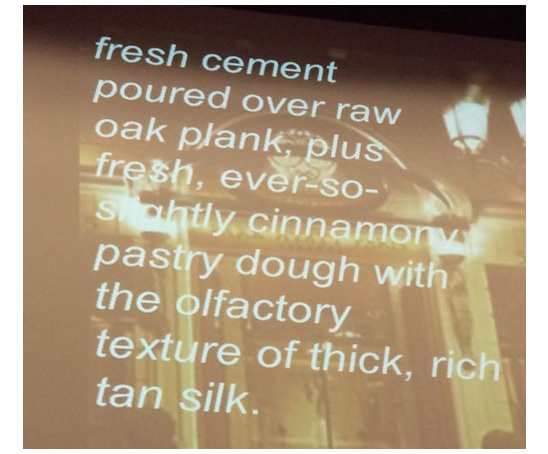How does what we wear affect our mood and others’ perception of us? And how do brands play on our psychological associations to influence us?…
As part of LCF’s popular Better Lives seminar series, Dr Carolyn Mair (Course Leader for MSc Applied Psychology in Fashion and MA Psychology for Fashion Professionals) has been examining positive psychology in fashion.
The third seminar in this year’s series focused on ‘Growing’ and presented the speakers Dr Morgaine Gaye, lecturer at Nottingham Trent University and academic mentor at Central Saint Martins, and Dr Kate Hefferon, Senior lecturer at the University of East London.
I'm at a lecture about scent branding and psychology. This is the signature scent of a Parisian hotel #lcfbetterlives pic.twitter.com/VRh2zwkOnj
— Cat Smith (@cat_sierra) February 9, 2015
Dr Morgaine Gaye began the Better Lives lecture by directing the audience’s attention to smell, and the importance of this, somewhat underrated, sense:
‘When people loose their smell, they tend to get incredibly depressed, it’s not considered as an important sense, but it really does dramatically effect our wellbeing.’
Gaye explained that scent can have profound impacts on our mental wellbeing, as well as evoke powerful feelings of nostalgia, attraction, repulsion and familiarity in individuals. Gaye further explained, these sensory effects are being utilised within sensory branding, a marketing tool favoured by companies such as British Airways, Bentley, H&M, and Hollister, in order to evoke certain emotions in association with their brand:
‘Scent branding is incredibly distinctive and complicated; it has to be specific to the brand and instantly distinguishable.’
During the second half of the lecture, Dr Kate Hefferon steered focus toward the clothed body, describing the effect on mental wellbeing that clothes, fashion and dress posses. Hefferon explained that clothes have the ability to influence our confidence, performance, posture and attitude, giving the example of female job interviewees:
‘Females wearing masculine clothes to job interviews are more likely to get the job, likewise, those who wear more revealing clothes are less likely to get the job.’
The clothes chosen for a job interview, for example, is what Hefferon termed an appearance management strategy, and the clothes we put on heavily manipulate our wellbeing:
‘Clothing has an effect on our happiness levels, and it can improve or effect our mood.’
Both Dr Kate Hefferon and Dr Morgaine Gaye agreed that the smells and clothes that surround and adorn us, dramatically affect our psychological wellbeing, and the influences that fashion has on our wellbeing can, once understood, be used as a powerful, and effective tool to positively influence our psychological state.
Words by Olexandra Solomka, MA History and Culture of Fashion now MA Fashion Culture
- Find out more about the Positive Psychology Better Lives Series 2015
- BA (Hons) Fashion Journalism
- MSc Applied Psychology in Fashion and MA Psychology for Fashion Professionals
- The Better Lives 2015 seminars have been organised by Dr Carolyn Mair
- Find out about the Well-being Research Hub

